RESEARCH DISSERTATION.
31 Pages5126 Words5 Views
Added on 2022-10-02
RESEARCH DISSERTATION.
Added on 2022-10-02
ShareRelated Documents
Running Head: RESEARCH DISSERTATION
RESEARCH DISSERTATION
Name of the Student:
Name of University:
Author Note:
RESEARCH DISSERTATION
Name of the Student:
Name of University:
Author Note:
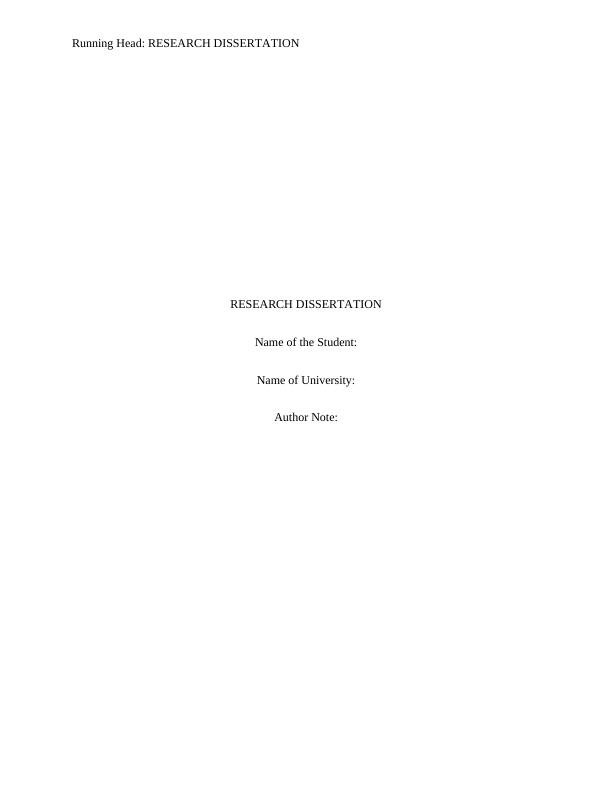
1RESEARCH DISSERTATION
Abstract
CRM is identified as one of the important tool that the business organisations are currently trying
to put emphasis in order to get strategic advantage. In this regard, there are certainly a number of
positive approach that are highlighted through the use of CRM technology in terms of brand
awareness and customer satisfaction that lead to the process of customer maximisation. This
research is trying to justify this fact of relationship between CRM and the customer
maximisation process in reference to Tesla. As an outcome, it can be confirmed that there is
definitely a positive relationship between brand awareness and customer satisfaction that are
enhanced by CRM technology and helps to maximise customer retention rate in Tesla.
Abstract
CRM is identified as one of the important tool that the business organisations are currently trying
to put emphasis in order to get strategic advantage. In this regard, there are certainly a number of
positive approach that are highlighted through the use of CRM technology in terms of brand
awareness and customer satisfaction that lead to the process of customer maximisation. This
research is trying to justify this fact of relationship between CRM and the customer
maximisation process in reference to Tesla. As an outcome, it can be confirmed that there is
definitely a positive relationship between brand awareness and customer satisfaction that are
enhanced by CRM technology and helps to maximise customer retention rate in Tesla.
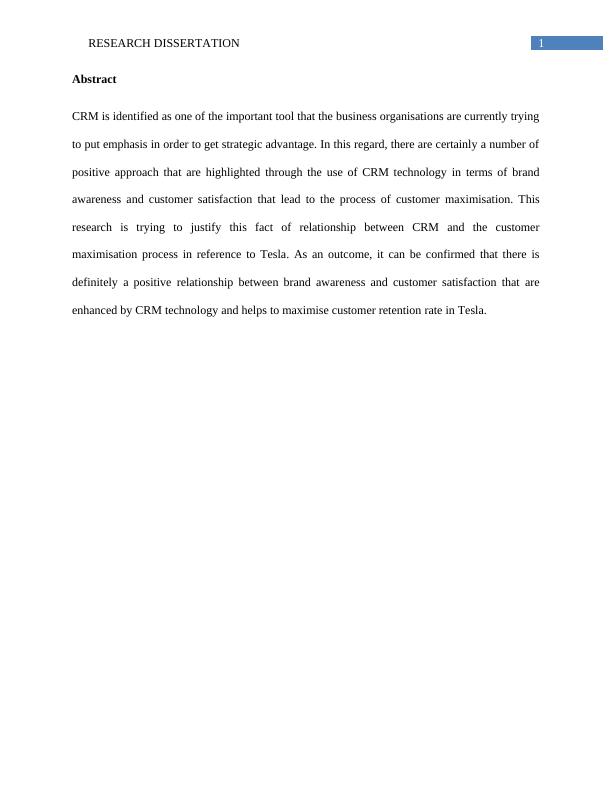
2RESEARCH DISSERTATION
Table of Contents
Chapter 1: Introduction....................................................................................................................3
1.1 Area of the research...............................................................................................................3
1.2 Business canvas model..........................................................................................................3
1.3 Relevance with company mission.........................................................................................4
1.4 Benefits of the research.........................................................................................................5
1.5 Area of research.....................................................................................................................5
1.6 Academic theories.................................................................................................................5
1.7 Scope of the research.............................................................................................................6
1.8 Expected outcomes................................................................................................................6
1.9 Mind map...............................................................................................................................7
Chapter 2: Literature review............................................................................................................7
2.1 Definition...............................................................................................................................7
2.2 CRM value chain model........................................................................................................9
Chapter 3: Ethical issues................................................................................................................13
3.1 Privacy questions.................................................................................................................13
3.2 Ethical consideration...........................................................................................................14
Chapter 3: Methodology................................................................................................................15
3.1 Research onion.....................................................................................................................15
3.2 Research philosophy............................................................................................................16
3.3 Research approach...............................................................................................................16
3.4 Research design...................................................................................................................16
3.5 Research strategy.................................................................................................................16
3.6 Sampling techniques............................................................................................................17
3.7 Data collection method........................................................................................................17
3.8 Data analysis technique.......................................................................................................17
Chapter 4: Data collection.............................................................................................................18
Chapter 5: Data analysis................................................................................................................26
Chapter 6: Conclusion...................................................................................................................27
Reference.......................................................................................................................................28
Table of Contents
Chapter 1: Introduction....................................................................................................................3
1.1 Area of the research...............................................................................................................3
1.2 Business canvas model..........................................................................................................3
1.3 Relevance with company mission.........................................................................................4
1.4 Benefits of the research.........................................................................................................5
1.5 Area of research.....................................................................................................................5
1.6 Academic theories.................................................................................................................5
1.7 Scope of the research.............................................................................................................6
1.8 Expected outcomes................................................................................................................6
1.9 Mind map...............................................................................................................................7
Chapter 2: Literature review............................................................................................................7
2.1 Definition...............................................................................................................................7
2.2 CRM value chain model........................................................................................................9
Chapter 3: Ethical issues................................................................................................................13
3.1 Privacy questions.................................................................................................................13
3.2 Ethical consideration...........................................................................................................14
Chapter 3: Methodology................................................................................................................15
3.1 Research onion.....................................................................................................................15
3.2 Research philosophy............................................................................................................16
3.3 Research approach...............................................................................................................16
3.4 Research design...................................................................................................................16
3.5 Research strategy.................................................................................................................16
3.6 Sampling techniques............................................................................................................17
3.7 Data collection method........................................................................................................17
3.8 Data analysis technique.......................................................................................................17
Chapter 4: Data collection.............................................................................................................18
Chapter 5: Data analysis................................................................................................................26
Chapter 6: Conclusion...................................................................................................................27
Reference.......................................................................................................................................28
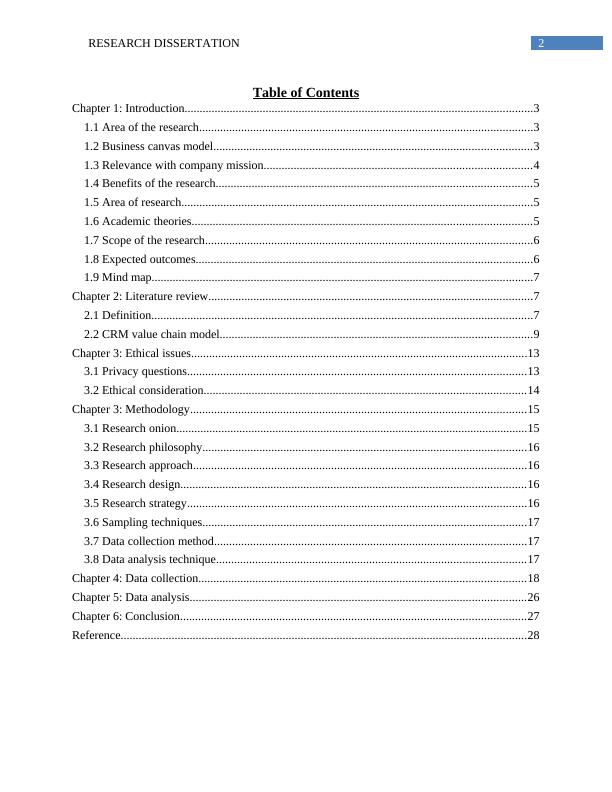
3RESEARCH DISSERTATION
Topic: Impact of CRM on customer maximization- A case study of Tesla
Chapter 1: Introduction
1.1 Area of the research
Customer Relationship Management (CRM) is considered to be one of the important
aspect in current business scenario. The technological advancement created rapid inclusion of
technology in the business practice. At the same time, the consumers are also getting aware of
every details of a particular company with the help of internet technology. It also influences the
buying behaviour of the customers that leads to implement a more rigorous and effective system
to connect with the customers effectively. CRM is a comprehensive technology that integrates
technology and long term mutual relationship between the private enterprise and its loyal
customers. According to Kamboj, Yadav and Rahman (2018) CRM assists the companies to
identify, select, develop and retain customers so that the profitability of the organisation will be
intact. Therefore, it can be stated that CRM technology is highly responsible for maximising the
customers.
1.2 Business canvas model
Key partners
Government
Major Suppliers
Car licencing
company
Key Activities
R&D
Design
Sales &
marketing
Customer
retention
Value
Proposition
Fully electric
vehicle (EVs)
Solar energy
systems.
Customer
Relationships
Brand
Reputation
Customer
service
experience
Customer
Segments
High end
luxury
Mid price
range
Topic: Impact of CRM on customer maximization- A case study of Tesla
Chapter 1: Introduction
1.1 Area of the research
Customer Relationship Management (CRM) is considered to be one of the important
aspect in current business scenario. The technological advancement created rapid inclusion of
technology in the business practice. At the same time, the consumers are also getting aware of
every details of a particular company with the help of internet technology. It also influences the
buying behaviour of the customers that leads to implement a more rigorous and effective system
to connect with the customers effectively. CRM is a comprehensive technology that integrates
technology and long term mutual relationship between the private enterprise and its loyal
customers. According to Kamboj, Yadav and Rahman (2018) CRM assists the companies to
identify, select, develop and retain customers so that the profitability of the organisation will be
intact. Therefore, it can be stated that CRM technology is highly responsible for maximising the
customers.
1.2 Business canvas model
Key partners
Government
Major Suppliers
Car licencing
company
Key Activities
R&D
Design
Sales &
marketing
Customer
retention
Value
Proposition
Fully electric
vehicle (EVs)
Solar energy
systems.
Customer
Relationships
Brand
Reputation
Customer
service
experience
Customer
Segments
High end
luxury
Mid price
range
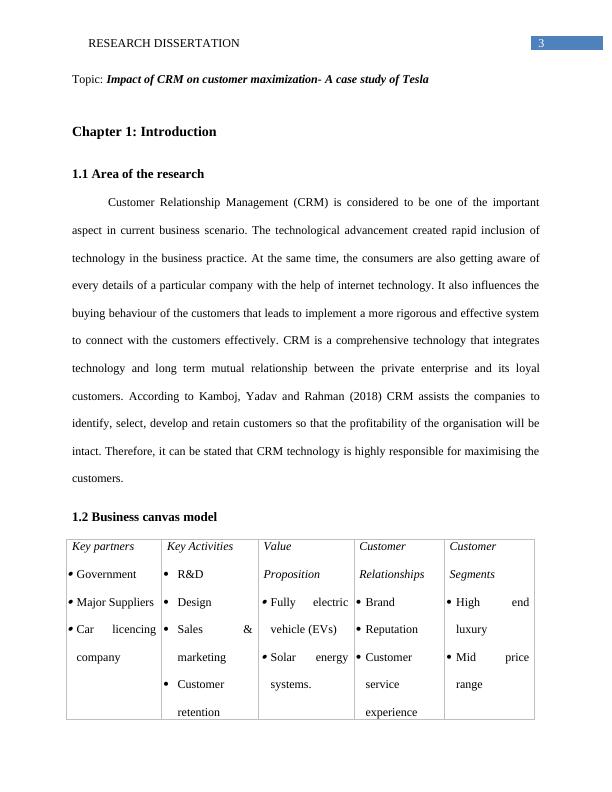
4RESEARCH DISSERTATION
Green
community
Key Resources
Electric vehicle
Automation and
engineering.
Channels
Retail stores
Online stores
Cost Structure
Cost of material and labour
Administrative cost
R&D cost
Revenue Streams
Automotive segment revenue
Energy generation
Figure 1: Business Canvas Model
(Created by the author)
1.3 Relevance with company mission
The mission statement of Tesla is “to accelerate the world’s transition to sustainable
energy”. As a result of that the organisation tries to maximise its customer base to a great extent
so that the transition to sustainable energy can be resolved effectively. In the initial phase Tesla
manufactured high end luxury cars. As a result of that only the rich people could buy the Tesla
cars. However, currently the company is willing to increase its brand value with sustainable
energy by manufacturing mid-price range cars. From the business canvas model it can be seen
that Tesla is interested in expanding its business by using the retail store promotional channels. It
will help to enhance the brand awareness and the benevolent practice that Tesla is making in
Green
community
Key Resources
Electric vehicle
Automation and
engineering.
Channels
Retail stores
Online stores
Cost Structure
Cost of material and labour
Administrative cost
R&D cost
Revenue Streams
Automotive segment revenue
Energy generation
Figure 1: Business Canvas Model
(Created by the author)
1.3 Relevance with company mission
The mission statement of Tesla is “to accelerate the world’s transition to sustainable
energy”. As a result of that the organisation tries to maximise its customer base to a great extent
so that the transition to sustainable energy can be resolved effectively. In the initial phase Tesla
manufactured high end luxury cars. As a result of that only the rich people could buy the Tesla
cars. However, currently the company is willing to increase its brand value with sustainable
energy by manufacturing mid-price range cars. From the business canvas model it can be seen
that Tesla is interested in expanding its business by using the retail store promotional channels. It
will help to enhance the brand awareness and the benevolent practice that Tesla is making in
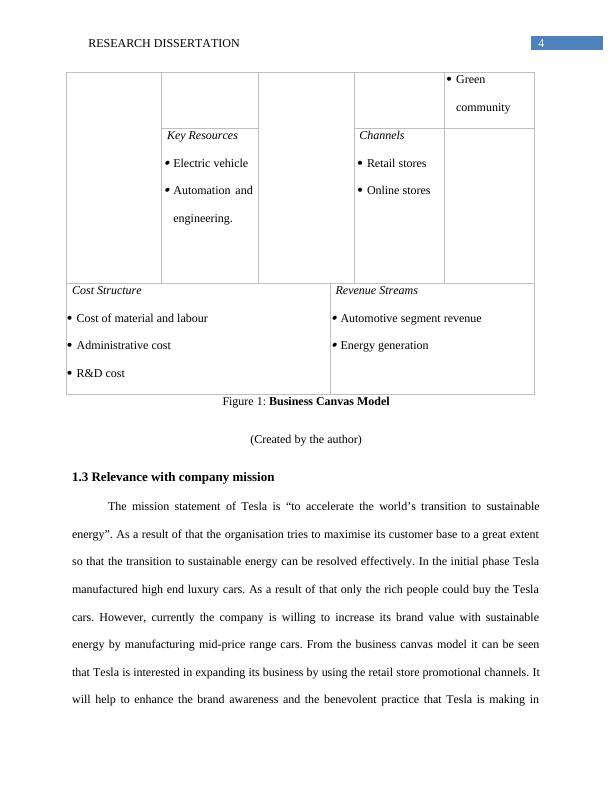
5RESEARCH DISSERTATION
terms of developing eco-friendly vehicle. In this regard, it is important for Tesla to follow a
better customer relationship in assistance with CRM technology.
1.4 Benefits of the research
This research will facilitate a close introspect into the impact of customer relationship
management practice within the organisation so that it will help to maximise customer for that
company. In case of Tesla, it is important to increase the number of customers through
enhancing the brand awareness. In this regard, the CRM technology is played a pivotal role by
creating satisfaction and loyalty to the customers. It can also be used as a promotional tool to
attract other customers and increase the customer base.
1.5 Area of research
This research is going to take a survey on the customers and finds out their response and
determining factors to buy a car. Moreover, it is also essential to incorporate different concepts
of CRM technologies within the survey questionnaire so that the responses of the customers will
be relevant with the research topic. However, there are some challenges regarding survey people
using luxury cars because most of them are reluctant to provide any response.
1.6 Academic theories
For this research, the CRM value chain model will be used in the literature review so that
it will facilitate an in-depth understanding regarding the role of CRM technology in
maximisation of customers.
1.7 Scope of the research
The scope of this research is to identify the value of CRM in business in order to develop
a strong customer base. Moreover, the organisational mission and vision is also incorporated into
terms of developing eco-friendly vehicle. In this regard, it is important for Tesla to follow a
better customer relationship in assistance with CRM technology.
1.4 Benefits of the research
This research will facilitate a close introspect into the impact of customer relationship
management practice within the organisation so that it will help to maximise customer for that
company. In case of Tesla, it is important to increase the number of customers through
enhancing the brand awareness. In this regard, the CRM technology is played a pivotal role by
creating satisfaction and loyalty to the customers. It can also be used as a promotional tool to
attract other customers and increase the customer base.
1.5 Area of research
This research is going to take a survey on the customers and finds out their response and
determining factors to buy a car. Moreover, it is also essential to incorporate different concepts
of CRM technologies within the survey questionnaire so that the responses of the customers will
be relevant with the research topic. However, there are some challenges regarding survey people
using luxury cars because most of them are reluctant to provide any response.
1.6 Academic theories
For this research, the CRM value chain model will be used in the literature review so that
it will facilitate an in-depth understanding regarding the role of CRM technology in
maximisation of customers.
1.7 Scope of the research
The scope of this research is to identify the value of CRM in business in order to develop
a strong customer base. Moreover, the organisational mission and vision is also incorporated into
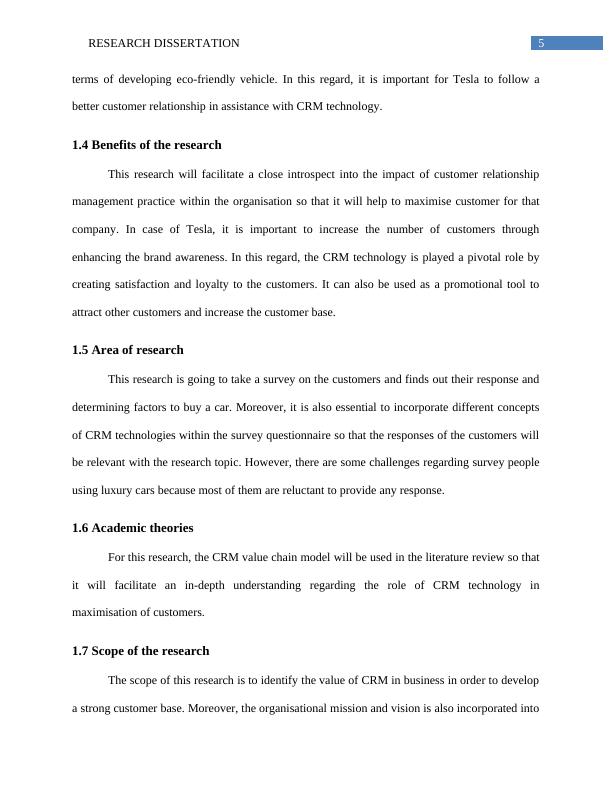
6RESEARCH DISSERTATION
Integration of
customers
Customer loyalty
Customer satisfaction
CRM
Technology
Customer maximization
the research so that it will guide to implement a CRM technology in accordance with the
organisational set up in Tesla.
1.8 Expected outcomes
The expected outcome will be customers are very much intrigued by the service quality
and relationship with the company. Therefore, the CRM technology is able to enhance customer
maximisation.
1.9 Mind map
Figure 2: Mind map
Integration of
customers
Customer loyalty
Customer satisfaction
CRM
Technology
Customer maximization
the research so that it will guide to implement a CRM technology in accordance with the
organisational set up in Tesla.
1.8 Expected outcomes
The expected outcome will be customers are very much intrigued by the service quality
and relationship with the company. Therefore, the CRM technology is able to enhance customer
maximisation.
1.9 Mind map
Figure 2: Mind map
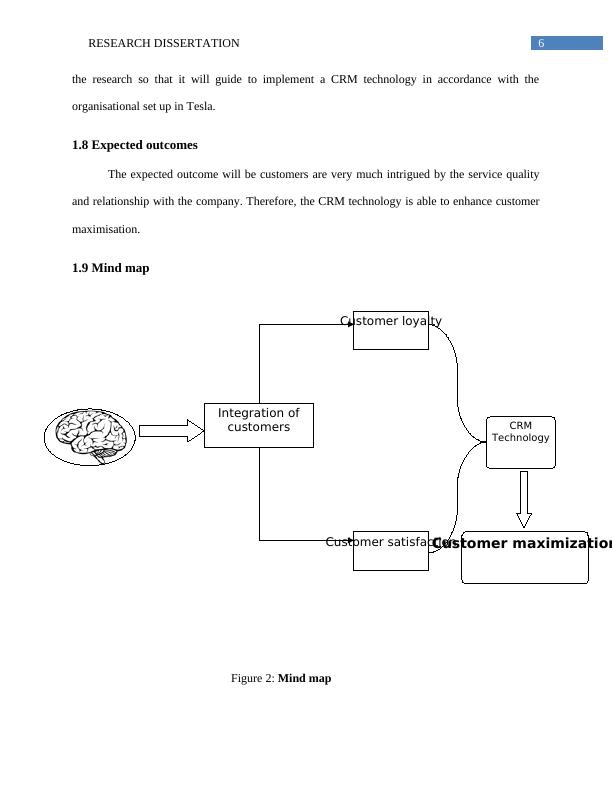
7RESEARCH DISSERTATION
(Created by the author)
Chapter 2: Literature review
2.1 Definition
CRM is a comprehensive system that is based on technology and the long term goal of
the organisation to facilitate a better practice of making relationship with the customers.
According to Navimipour and Soltani (2016) it can be stated that the CRM is a concept that can
help to build better relationship with the customers. In this regard, the purpose of CRM is
bestowed within the term where the process or the mechanism is trying to build a good
relationship with the customer. Moreover, the research of González-Benito, Venturini and
González-Benito (2017) also intends to define CRM as a concept or a notion that integrates
people in terms of both the customer relationship staffs and the customers. As a result of that it
becomes effective for the company to set direct interaction with the consumers and acknowledge
their valuable demands positively. It is important for an organisation to put a great deal of
emphasis on the behaviour and requirements of the customers so that proper marketing strategy
and promotional channels can be developed. This arguments are further corroborated by the
analysis of Nunan et al. (2018) where the research pointed out CRM as a strategic method that
can bring high profitability within the organisational fold. The profitability of the organisation
can be heighted through the maximisation of its customers. There are some important facets that
the CRM concept contains such as direct interaction with the customers, putting thrust on the
future values of the customers and segmenting customers on the basis of organisational mission
and objectives. As a result of that it can be stated that the CRM technology is highly focused on
retrieving all the information of the customers.
(Created by the author)
Chapter 2: Literature review
2.1 Definition
CRM is a comprehensive system that is based on technology and the long term goal of
the organisation to facilitate a better practice of making relationship with the customers.
According to Navimipour and Soltani (2016) it can be stated that the CRM is a concept that can
help to build better relationship with the customers. In this regard, the purpose of CRM is
bestowed within the term where the process or the mechanism is trying to build a good
relationship with the customer. Moreover, the research of González-Benito, Venturini and
González-Benito (2017) also intends to define CRM as a concept or a notion that integrates
people in terms of both the customer relationship staffs and the customers. As a result of that it
becomes effective for the company to set direct interaction with the consumers and acknowledge
their valuable demands positively. It is important for an organisation to put a great deal of
emphasis on the behaviour and requirements of the customers so that proper marketing strategy
and promotional channels can be developed. This arguments are further corroborated by the
analysis of Nunan et al. (2018) where the research pointed out CRM as a strategic method that
can bring high profitability within the organisational fold. The profitability of the organisation
can be heighted through the maximisation of its customers. There are some important facets that
the CRM concept contains such as direct interaction with the customers, putting thrust on the
future values of the customers and segmenting customers on the basis of organisational mission
and objectives. As a result of that it can be stated that the CRM technology is highly focused on
retrieving all the information of the customers.
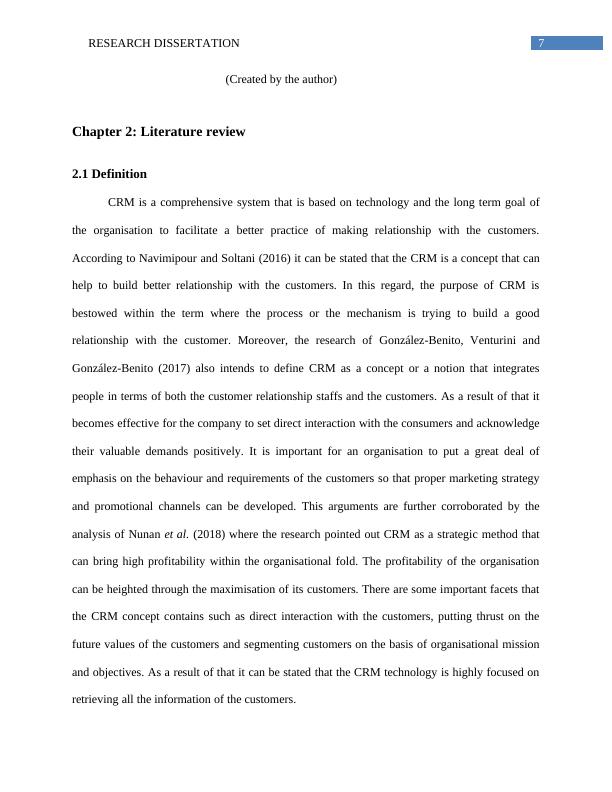
End of preview
Want to access all the pages? Upload your documents or become a member.
Related Documents
Customer Relationship Management - Easy Jetlg...
|57
|14679
|46
Customer Relationship Management (CRM) Systems PDFlg...
|43
|12752
|340
The influence of customer relationship marketing on customer satisfaction in the food retail sector in the UK TESCOlg...
|41
|13197
|473
Predicting Brand Loyalty in Automobile Industrylg...
|86
|21013
|1
Business Plan for International Standard Swimming Poollg...
|66
|17305
|89
Impact of Brand Awareness on Customer Loyalty: A Case Study of MTN Group Limitedlg...
|92
|20268
|149
